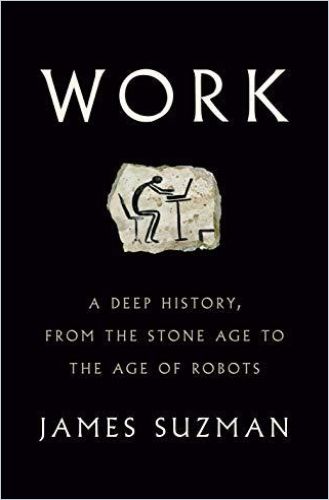James Suzman presents a compelling historical overview of work while lamenting humankind’s infinite acquisitiveness.

Abandon Envy
James Suzman explores critical themes around the past, present and future of work. Drawing on history and anthropology, he posits a future in which work need not dominate life. Suzman explains his view that artificial intelligence (AI) will increasingly displace workers, and his fear that innate human acquisitiveness – which compels people to work and earn more and more – will destroy civilization.
In 1828, Suzman relates, French mathematician Gaspard-Gustave Coriolis coined the term “travail,” which links work with pain. Today, anything a human, machine or animal does that expends energy is defined as work.
Living things consume and expend energy, like engines, and living things are programmed by evolution to work in order to survive. Life arose and endured because it performs work. The tools Neanderthals and early Homo sapiens crafted indicate the cognitive and physiological characteristics that continue to distinguish human work today. For 300,000 years, human beings differentiated themselves by learning and gaining new skills.
Labor/Leisure
The idea that people must perpetually work, grow and consume more is simply false. People work to advance their careers, earn money, complete a project or fill time.
Often, the only thing that differentiates work from leisure is context and whether we are being paid to do something or paying to do it. James Suzman
Many animals work for reasons beyond food, reproduction or survival. For example, the males among Africa’s southern masked weaver birds build, on average, 25 nests per mating season, each requiring days of work. As one nest after another fails to meet a female’s standards, the male weaver dismantles it and tries again. In the end, the location of a nest impresses females more than the nest itself.
Start Cooking
The advent of cooking gave hominids access to more plants for food, safer consumption of more energy-producing meat and the ability to preserve it. That consumption and preservation granted them time for activities other than hunting and foraging.
Humanity’s ancestors felt compelled to fill their leisure time. Having time to think encouraged greater brain development and gave rise to curiosity, creativity, art and discovery.
Boredom is a more fertile mother of invention than necessity. James Suzman
Boredom likely drove the creation of rough jewelry at least 70,000 years ago and of cave wall paintings dating back more than 35,000 years. As hunting grew less important, the human desire for entertainment increased. Compelling storytellers saw their status improve.
The Agricultural Revolution
When a glacial cold period gave way to warming 18,000 years ago, the amount of arable land increased. In some places, harvests were bountiful, and a few weeks of work could feed a family for a year. Some farmers retained time for art, construction and other trades, and the kinds of work diversified.
In terms of work, the most important energy revolution was farming. James Suzman
As farms prospered, populations expanded. This depleted supplies and invited hunger, even starvation. Where the right high-energy crops thrived, hard work created surpluses. Village and city populations grew as farm productivity increased.
Where the grains were less caloric, however – as in parts of North America and the Pacific Islands – indigenous populations raised crops, but their harvests yielded little that was surplus. Populations stayed smaller and healthier and, perhaps, less hardworking.
Workaholism
Smart machines and artificial intelligence (AI) will bring a future in which robots perform much or most of the work. However, for now, people are subject to workaholism and work stresses which manifest in poor health, increased sick days and burnout. Even skilled white-collar workers suffered during the Great Recession of 2008–2009. In Japan, many workers die or kill themselves each year, ostensibly due to overwork. Countless workers in China dedicate themselves to the “996” way of life – 12-hour workdays from nine in the morning to nine at night, six days per week.
Infinite Aspiration
Since the beginning of the Industrial Revolution – indeed, since the first plows broke land and farming began more than 10,000 years ago – people and societies have equated work with virtue and goodness.
The message that hard work creates value is drip-fed into children almost everywhere in the hope of instilling a good work ethic.James Suzman
In 1930, economist John Maynard Keynes predicted that by today, technological advances would give everyone all they needed from a 15-hour workweek. Keynes was mostly correct, but he erred in believing human nature would change. Envy and infinite acquisitiveness never diminish.
Relaxing
The Bushmen of South Africa, the Hadzabe of East Africa and members of similar tribes migrated for agricultural jobs and other work. But they approach work and the distribution of food and goods the way humans did prior to agriculture and industrial revolution.
They worked little, spending most of their time in social and artistic pursuits. In regions with hard winters, some indigenous tribes stored food for long periods. In Africa, most didn’t need to store food, and they hunted only when they had to.
Wants may be easily satisfied…either by producing much or desiring little. Anthropologist Marshall Sahlins
Many hunter-gatherer tribes led longer, healthier and more satisfied lives than those of farmers, townspeople, ancient Romans or contemporary Wall Street bankers.
No Work
Most people believe in the intrinsic value of work, even when their work contributes little. Most human beings seek purposeful pursuits, even if they call them leisure.
Artificial intelligence could displace workers in up to half of the current jobs in advanced economies and could render unnecessary much of the work those economies outsource to developing nations. Along with other forces, this will cause economic disparities to widen.
But AI might liberate you from unpleasant work. Embrace this possibility. Learn from your ancestors, who worked little and enjoyed full creative and social lives while remaining healthy and satisfied. Suzman’s message: Abandon envy and aspire to acquire less.
Anti-Ambition
For a man who wrote an ambitious book that required a lot of work, Suzman remains ambivalent about working too hard or seeking too much. His studies of African tribal peoples and of today’s urban workers lead him to conclude that little has changed since the first emergence of urban societies: People are greedy and needlessly so. Suzman provides a fascinating overview of the history of work and its place in evolving cultures. He’s passionate about his topic and his passion proves infectious. Underlying that passion is Suzman’s sense of human acquisitiveness as the fundamental tragedy of the species. The author’s sense of tragedy gives this history a profound gravitas.
James Suzman also wrote Affluence Without Abundance.




